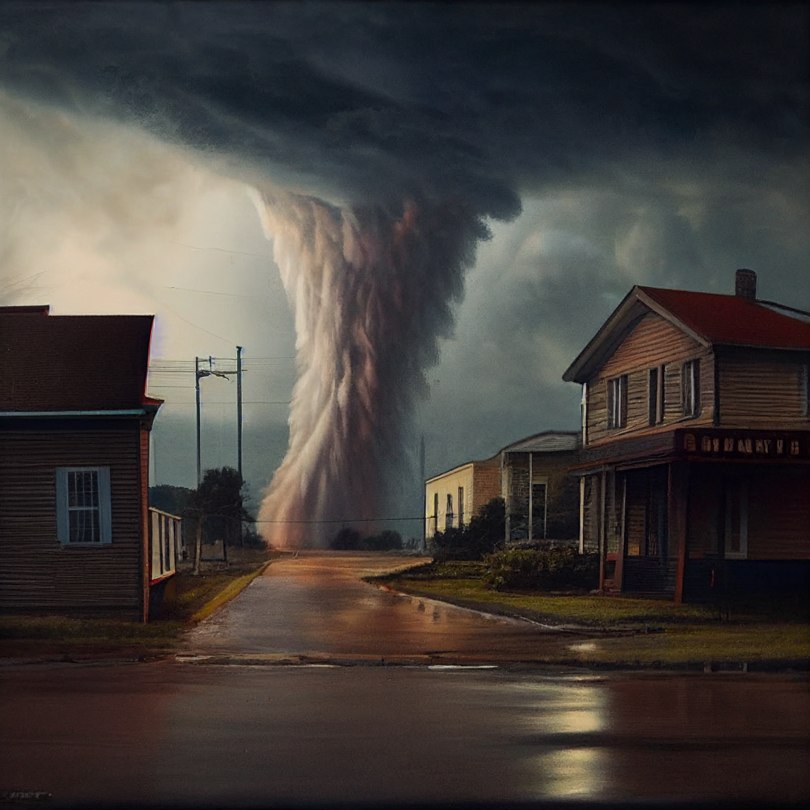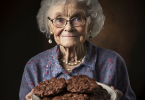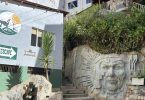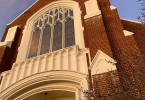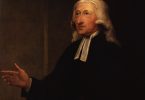On a cloudless October day, I was kneeling in my garden, pushing tulip bulbs deep into the moist, autumn earth, when my reverie was interrupted by a quarrel between two of my neighbors, Donald and Mary Claire Babbit.
Mary Claire dabbed at her eyes, smearing her eyeliner in the process. “We’re losing everything?”
Donald shook his head. “You can’t blame me! These things happen! I’m just doing what I think we need to do to stay safe!”
I don’t get a lot of time to garden, so I tried keeping my head down and my eyes averted. But when the two of them saw me, they made a beeline across my perfect rye grass. Soon, they towered over me, waving their arms and emphasizing their words with broad gestures.
“Everything we worked so hard for? Lost?” Marie Claire wailed. “Someone should do something!”
“Makes me so damn angry,” Donald said. “I never thought I’d see this day, but it’s clear to me the time has come!” He looked down at me. “You don’t seem properly concerned, Anita.”
I sighed, put my trowel down, and looked up at him, shielding my eyes with a gloved hand. “Concerned by what, Donald?”
“The tornadoes!” Donald huffed, exasperated.
“We’re losing our homes to them,” Marie Claire said, wringing her chubby little hands.
I stood up and studied the sky. “What tornadoes?”
“Total destruction is assured for those without protection,” Donald said. “And there’s not much time.”
Marie Claire pressed her hands against her ears, her jowls jiggling. “It’s already happening!”
I frowned at them both. “Where are you getting this news?”
“From the source,” Donald said. “A famous meteorologist.”
“We watched all his videos,” Marie Claire added.
I pulled out my phone and checked the weather. “I don’t see any tornado watches or warnings.”
“Don’t you be fooled, Anita Church,” Donald said. “There are plenty of warnings. Why, one was issued just moments ago.”
“In California,” Marie Claire said, gazing at the horizon with obvious dread.
I burst out laughing, thinking they had to be joking. Their glares told me I’d made a mistake, so I sobered quickly. “We’re in Mississippi,” I said. “California is about two thousand miles away.”
“Oh, that’s where the tornadoes are now,” Donald said, shaking his finger at me. “But they’re on the move, and they’re headed this way.”
“That’s not how tornadoes work,” I said. “Warnings are very local. None of us are under a tornado warning. A tornado out west just isn’t a threat.”
“Yet!” Marie Claire squeaked. “It’s only a matter of time! And we’re not ready. If we don’t take action now … the tornadoes will sweep in and wipe out everything we hold dear!”
Donald glared at me again. “I don’t know what’s more upsetting, Anita — the pending destruction or your total denial of it.”
I was beginning to lose my patience. “Donald! You’re getting upset over nothing! Just … calm down and look around. There are no tornadoes here.”
Donald drew a breath to speak, but about that time, a sleek black sedan pulled up to the curb at the edge of my lawn. “Ah,” Donald said. “If you won’t listen to me, then maybe you’ll listen to him.”
When the engine cut off, two stern-looking men got out. The first, a white-haired man in a white colonial suit, looked a bit like he ought to be selling fried chicken. The second, his companion, was squat and bearish, with a bristling brown beard and a tight, apple-shaped belly. He scrambled around in a frenzy, snatching a sheaf of papers from the back seat and guiding his friend by the elbow as they crossed the lawn.
“Allow me to introduce myself,” the man in white said, using a sonorous voice that was part Foghorn Leghorn, part buttered bourbon. “I’m Doctor Carillon, meteorologist at large, and this is my assistant, Mr. Breedle, of Breedle Underground Shelters, Inc.” He gave me a sympathetic look. “I’m terribly sorry for your loss.”
“What loss?” I asked.
Mr. Breedle consulted his sheaf of papers. “Your house, of course. And all the others on this street that we’ve scheduled for demolition today.”
My eyes bulged. “What?!?”
Carillon pulled on a pair of spectacles and studied the papers Mr. Breedle handed him. “I’m afraid so.”
I blinked. “Why?”
Carillon peered at me over the rims of his glasses. “The tornadoes, of course.”
I tossed my gloves on the ground. “So you’re the one getting everyone riled up over tornadoes? This is ridiculous. There are no tornados here.”
“Well, they haven’t happened yet,” Carillon admitted, stretching his neck and making his wattle quiver. “But they will. And so we must take precautionary measures.”
I folded my arms. “You’re tearing down our houses … just because you think tornados might be coming?”
“We know they’re coming,” Carillon said. “It’s just a question of when.”
“The demolition is for your own protection,” Breedle added, reassuring me with a smile. “And once we tear your house down, we’ll build you a tornado shelter on this very spot.”
I felt my blood pressure rising. “Man, look around. The sky is blue. The weather’s fine. This is a beautiful day. Why are you going on about tornadoes?”
Carillon stamped his white-booted foot. “To paraphrase Scripture, ‘Behold! They come quickly!’ They’re all around us! A funnel cloud of doom could extend downward from the skies at any time!” He pointed down the street, then pointed at Marie Claire’s house. “There! Or there!”
Marie Claire squeaked and buried her face in Donald’s shoulder, sobbing.
I checked my phone again, just to be sure. “The only tornado warning in the United States was in California. And they just lifted it. It’s over.”
“On the contrary,” Carillon said. “This is just the beginning. First, the tornadoes are in far away places! And the next thing you know, they are right here … in your very own neighborhood.” He lowered his voice to a whisper. “If you don’t think tornadoes can happen here … you don’t know what you’re dealing with.” He brightened. “I know about these things. I’m a meteorologist.”
I could barely speak. “Okay, so, let me get this straight. You want to tear down my house.”
“Yes,” Carillon said.
“For your own protection,” Breedle added.
“And replace it with an underground shelter.”
Carillon looked at me proudly. “Yes.”
“For your own protection,” Breedle repeated. “And — to keep your children safe. It’s really all about the children, when you get down to it.”
“And you’re wanting to do this because there was one tornado on the other side of the country?”
Carillon put an arm around Breedle and gave him an affectionate squeeze. “You see? She’s coming around.”
I took a deep breath. “And this is all because one day, a tornado might happen here.”
“I knew you would understand!” Carillon said, fist-bumping Breedle. “Let the demolition commence!”
“No!” I drew myself up to my full height and got up in Carillon’s face. “I see what you’re doing! You predict tornadoes … and your friend here profits from building tornado shelters! Meanwhile: there … are … no … tornadoes!”
Carillon sniffed. “Tornadoes exist, yes? Surely two reasonable people can agree on that fact?”
I rolled my eyes. “But there’s not one here!”
Carillon shook his head, as though pitying me. “Surely you understand the importance of building shelters before the storms arrive.”
“Okay,” I said, crossing my arms. “If a tornado were to come—“
“Oh, they’re coming,” Carillon said. “You may depend upon it.”
“If and when a tornado comes,” I continued, “what’s the worst it could do? Destroy my house?”
“It might just do that,” Carillon said, looking past me and peering at my home. “And it would be a shame, too. It’s a nice place.”
“And so to protect me—“
“And your children!” Breedle said, brushing away a tear and putting a hand over his heart. “And your future grandchildren.”
“—you want to destroy my house right now, before the tornado comes.”
“I see we’ve reached an understanding,” Carillon said. “The papers, please, Mr. Breedle. She’s ready to sign.”
“No,” I said. “I’m not signing anything.”
Carillon smiled a wide smile. “Mrs. Church, perhaps it would help you come around if I were to explain that this really isn’t about tornadoes at all.”
“It clearly isn’t,” I said.
“Tornados are what we call ‘the presenting issue,’” Breedle said. “Tornadoes destroy family homes, and traditional families are the cornerstone of a stable society. So the real issue here is the preservation of good, traditional Mississippi values.”
“Now you’re just pulling arguments out of your ass,” I said. “You can say you’re protecting traditions all you like, but any fool can see you’re tearing down our houses because you profit from it.”
“Our culture has betrayed us!” Carillon intoned, spreading his fingers wide. “And our lawmakers are soft! They are all leftist, progressive, Democratic homosexual communist drag queens, with no regard for the values that made America great!”
Marie Claire, upon hearing this, fell to her knees and began to pray.
Carillon placed a hand on her head, as though delivering a blessing. “And given that those so-called leaders refuse to take action on tornado safety … because they will not pass laws that would have made the tornadoes out west illegal … we must take things into our own hands.”
A sudden insight made my arms break out in goosebumps. “You’re completely disconnected from reality.”
“No more discussion!” Carillon said sharply. “This neighborhood of yours isn’t safe. Any further discernment on the matter is moot, anyway, because the matter has already been decided.”
Donald and Marie Claire, looking suddenly guilty, began sneaking toward the street.
I was having none of it. “Donald! Marie Claire! What did you do?”
Donald crossed his arms and poked out his lower lip. “You can’t blame us. It was a unanimous vote of the Neighborhood Tornado Safety Council.”
My head was swimming. “There’s no such thing.”
“There is!” Marie Claire squealed. “The NTSC was formed by the Reverend Dr. Carillon, and chaired by Mr. Breedle, and they gave voting positions to all of us who have watched their videos.” She studied her own tiny feet. “We were going to put you on the committee, but everyone said you’d just be a troublemaker.” She looked up at me. “Honestly? It seems like they were right.”
I put my hands on my hips. “What was this so-called vote by a bogus stacked committee about?”
“Having the entire neighborhood, including your house, demolished,” Carillon said. “And the measure passed with eighty percent in favor of prophylactic demolition. Now the construction of underground shelters can begin, rendering the entire neighborhood safe from tornadoes.”
“This is insane,” I said.
“We should hurry,” Carillon said, checking the horizon. “A tornado could come any minute.”
“No, it won’t,” I said flatly.
“But it could,” Breedle said. “It’s possible, and that’s basically the same as probable. And probable basically means the same thing as certain.”
I yanked my own hair. “Something being remotely possible is not the same thing as it being certain!”
“With the vote secure, the demolition of your home will proceed apace,” Carillon said. “And you will be charged five hundred thousand dollars.”
“WHAT?!?”
“I know,” Carillon said. “You’re welcome.”
I pointed to the street. “Get away from my house.”
“There are two kinds of people in this world,” Carillon said. “Those who are pro-protection, and those who are anti-protection.” He waggled his finger at me. “You’re not anti-protection, are you, Mrs. Church? Because that would make you pro-tornado.”
Breedle pointed at me. “And if you’re pro-tornado … you might as well be a tornado yourself … and, therefore, something we should protect ourselves from.”
Suddenly, down the street, a terrible concussion sent a mushroom cloud of debris into the air. As the dust and dirt settled, I could see a pile of rubble where Donald and Marie Claire’s home once stood.
“Just as Doctor Carillon forecasted!” Marie Claire wailed, pointing at me. “We told you it could happen here!”
“That was no tornado!” I yelled. “This mad meteorologist blew your house up!”
“No, he didn’t,” Donald murmured. “I did it.” He fished a tiny device out of his pocket. “Mr. Carillon gave me a remote control with a button to press in the event we encountered resistance and disbelief.”
“Donald J. Babbit!” I said. “Because these men told you tornados might be coming someday … you blew up your own house?”
“To prove to you what’s possible,” Donald said, a gleam in his eye. “And now, we will move into the windowless underground shelter Mr. Breedle will build on our behalf, and we will never leave it. Our entire underground life will be a testimony: to you, to the culture, to the world. Even as tornadoes swirl all around us … even though the culture becomes pro-tornado because of people like you … even though lawmakers won’t pass laws to make tornadoes illegal … Marie Claire and I will be safe.”
“We will be safe!” Marie Claire repeated, hugging herself, her eyes shut tight. “Thank God for men like you, Reverend Carillon!”
Down the street, another house exploded … and then another.
“Our greatest fears have become reality,” Carillon said, checking his watch. “The tornadoes are practically upon us.”
“This destruction isn’t because of tornados!” I pointed at Carillon. “It’s all because of you! Everyone was fine before you started this!”
Carillon sneered at me, his voice dripping disdain. “Everyone is fine? Look around, Mrs. Church. Your neighborhood is a shambles. Your friends are distraught and homeless.”
“Because of you!” I shouted.
Doctor Carillon held up his hand to silence me. “Enough. The deadline has been reached. Your house must be demolished. Mr. Breedle?”
Breedle produced a small box from his pocket and thumbed a switch.
The force of the explosion knocked me to the ground. When the dust cleared, I found I was pinned beneath rubble of my own home, in shock and barely able to breathe.
“There, there,” Mr. Carillon said. As he walked into my field of vision, I could see picking up a heavy chunk of debris. He approached me, loomed over me, and held the rock four feet or so over my head. “It’s almost over now.”
He closed one eye and lined the chunk of concrete up carefully, as though aiming a gun. “Did you know, Mrs. Church, that the majority of fatalities in tornadoes are due to head injuries?”
I struggled to move … to speak … but could do neither.
As the heavy mass of cement tumbled toward me, it made a sound like a rushing, mighty wind.

